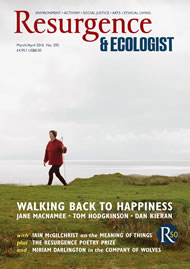Imagine knowing that an asteroid was certain to obliterate Earth 30 days after your death. Or that humans became infertile, and faced extinction following the natural lifespans of those currently living. Contemplating these events would fill most people with dread – but why? You’d be safely dead. Nobody in the second scenario even dies prematurely. So why are they such horrifying prospects?
These are the thought experiments Samuel Scheffler explores in his remarkable book Death and the Afterlife, asking an uncomfortable question: would our lives still have meaning if we knew there was no future for humans? He’s not sure that they would.
Some projects would quite obviously lose their allure. Finding a cure for cancer, for example, would suddenly seem pointless if there were no future generations to feel the benefits of a breakthrough. But Scheffler doesn’t stop there – persuasively arguing that even a good meal would become drained of value once your life was no longer part of a shared human history.
This is unsettling enough. But maybe the deeper question is: are these really only thought experiments? When the worst consequences of ecological breakdown offer a real-life scenario akin to Scheffler’s disasters, perhaps they aren’t. And looked at in this way, Death and the Afterlife provides a challenging new insight into the psychology of climate change. If you accept Scheffler’s arguments, climate breakdown offers more than a threat to civilisation and ecosystems. It is a threat to meaning itself.
The uplifting flipside of Scheffler’s argument is that it forces us to reconsider the limits of our egoism and individualism. One of capitalism’s greatest con tricks is to have utterly convinced us we act mainly – or even solely – from self-interest. But Scheffler reminds us how social humans are, arguing – among other related points – that the lives of those of those we will never even meet matter more to us than our own deaths. Considering the current relationships between capitalism, society and climate change, this is strangely welcome news.
Of course, this is all to talk about the afterlife in quite a different way from how it’s commonly understood. But our familiar interpretations are worth exploring in this context too. In contrast to Scheffler’s secularism, Greg Garrett probes our more traditional desires for personal afterlives in a freewheeling study of television, movies and video games. Leading us through Gotham City, South Park and the island from Lost, Entertaining Judgment makes more conventional claims about what humans seem to want from life beyond death based on how we imagine it.
Garrett’s primary definition is cribbed from Field of Dreams. Heaven is “a place where dreams come true” and as such, it differs from person to person. For Kenny in South Park, it’s topless women. For Colton in Heaven Is for Real, it’s a rainbow horse. It’s a recognisable description of a decent afterlife, but with its firmly individualistic focus, it fails to explicitly recognise our social desires highlighted by Scheffler’s more sophisticated work.
Entertaining Judgment’s stronger insights relate to our imaginations of the malevolent afterlife, and how they act as flexible metaphors for whatever most frightens us at any given time. What we fear most is usually the future – the life to come, in one form or another. For Garrett, zombies act as a metaphor for war, natural disasters and pandemics. I’d add climate change to the list.
In zombie films, the web of our social relations – the bonds between family, friends and citizens – crumbles within meaningless, ravenous disorder. But the way we shape these stories – the rescue helicopter that swoops in, heralding the survival of civilisation – reflects our desire to impose order over existential chaos. We want to believe that we’ll be delivered from the future’s worst evils: the breakdown of civilisation and history; the unbearable erosion of human meaning.
Both books suggest that individuals want their lives to remain within a wider tapestry of human history. But Scheffler goes further than to say we simply want this. For him, this gives our lives meaning. And our belief in an afterlife – secular or religious; personal or collective – sustains this meaning. Neither book is particularly concerned about whether our hopes for the afterlife are actually satisfied. Instead they’re interested in what these desires reveal about us and our values. And in doing so, they illuminate the deeply social and collectivist attributes of the human animal from surprising new angles.







